Related Research Articles
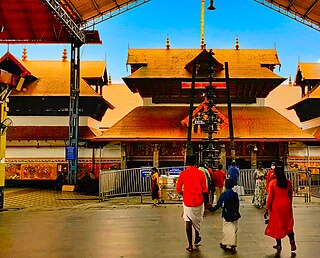
GuruvayurIPA:[guɾuʋɐːjuːr]) is a municipal temple town in Thrissur district, of Kerala State in India. It is a suburban town of Thrissur city, located 26 kilometres (16 mi) from Thrissur towards the north-west. It houses the Guruvayur Shri Krishna Temple. It is located at a distance of 292 km (181 mi) from the state capital Trivandrum towards the north-west, 86 km (53 mi) from Kochi towards the north, 95 km (59 mi) from Calicut towards south.

The Kingdom of Cochin or the Cochin State, named after its capital in the city of Kochi (Cochin), was a kingdom in the central part of present-day Kerala state. It originated in the early part of the 12th century and continued to rule until its accession to the Dominion of India in 1949.
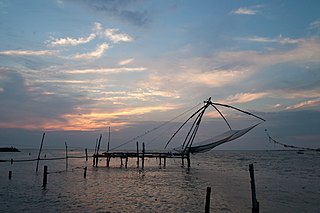
Fort Kochi, formerly known as Fort Cochin or British Cochin, is a neighbourhood of Kochi city in Kerala, India. Fort Kochi takes its name from the Fort Manuel of Kochi, the first European fort on Indian soil, controlled by the Portuguese East Indies. This is part of a handful of water-bound islands and islets toward the south-west of the mainland Kochi, and collectively known as Old Kochi or West Kochi. Adjacent to this is the locality of Mattancherry. In 1967, these three municipalities along with a few adjoining areas, were amalgamated to form the Kochi Municipal Corporation.

Korapuzha, also known as Elathur River, is a short river of 40 km (25 mi), with a drainage area of 624 km2 (241 sq mi), flowing through the Kozhikode district of Kerala state in India. It is formed by the confluence of two streams, Akalapuzha and Punoor puzha which originate in the mountains of Wayanad district. The Korapuzha empties into the Arabian Sea at Elathur. The river and its main tributaries become tidal as they near the Arabian Sea. There is heavy boat traffic over the last 25 km (16 mi) of its course. It forms part of the West Coast Inland Navigation System.

The Arattupuzha Sastha Temple is a Hindu temple situated at Arattupuzha in Thrissur district of Kerala in India, administered by Cochin Devaswom Board.

Chittur-Thathamangalam is a town and municipality in Palakkad district of Kerala State, India. It is the headquarters of Chittur taluk, 13 km (8.1 mi) south-east of Palakkad, on the banks of the Kannadipuzha, a major headstream of the Bharathapuzha, the second longest river in Kerala. A Mini Civil Station is also located here which provides government related services. It consists of two areas, Chittur and Thathamangalam which together form the municipality.

Thrissur is the administrative capital of Thrissur District, in the central part of Kerala state, India. Thrissur district was formed on 1 July 1949. It is an important cultural centre, and is known as the Cultural Capital of Kerala. It is famous for the Thrissur Pooram festival, one of the most colourful and spectacular temple festival of Kerala. From ancient times, Thrissur has been politically, economically and culturally significant to the Indian subcontinent. It has opened the gates for Arabs, Romans, Portuguese, Dutch and English. According to tradition, Thrissur is where Christianity, Islam and Judaism entered the Indian subcontinent. Local Christian tradition holds that Thomas the Apostle arrived in 52 CE, and Muslim tradition states that Methala is the location of country's first mosque.
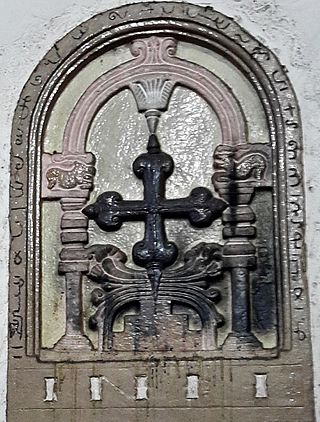
Raja Thoma of Villarvattom was a feudal monarch of Villarvattom, a vassal fiefdom of the Kingdom of Cochin.

Punkunnam Shiva Temple is a small temple dedicated to the Hindu god Shiva, located in Punkunnam, a suburb of Thrissur city in Kerala. There are shrines to Parvati, Ganapathi, Ayyappan, Krishna as Parthasarathy and Nāgas. It is administered by Cochin Devaswom Board.

Hill Palace is an archaeological museum and palace located in the Tripunithura neighbourhood of Kochi, Kerala. It is the largest archeological museum in the state and was the imperial administrative office and official residence of the Cochin Maharaja. Built in 1865, the palace complex consists of 49 buildings spreading across 54 acres (220,000 m2) and built in the traditional architectural style. The complex has an archaeological museum, a heritage museum, a deer park, a pre-historic park and a children's park.
Devaswom are socio-religious trusts in India, whose members are nominated by the government and community. They oversee Hindu temples and their assets to ensure their smooth operation in accordance with traditional rituals and customs. The devaswom system notably exists in the state of Kerala, where most temples are either managed by Government of Kerala-controlled devaswoms or private bodies or families. The properties of each temple are deemed to be the personal property of the presiding deity of the temple, and are managed through a body of trustees who bear allegiance to that deity.

Annamanada Mahadeva Temple is a Hindu temple located at Annamanada in Thrissur District, Kerala. The presiding deity of the temple is Shiva. The shivling is almost four feet tall and is considered as the Kiratamoorthy in a pleasing mood while giving Pashupatastra to Arjuna. It is considered to be one of the 108 jyotirlinga. The temple is being administered by the Cochin Devaswom Board.
Parasuvaikkal is a village in Thiruvananthapuram district in the state of Kerala, India.

Vadakkechira is one of the four oldest ponds in Thrissur city of Kerala in India. It was built by Shakthan Thampuran (1751-1805) and is one of Thrissur's famous landmarks. It is owned by Cochin Devaswom Board.
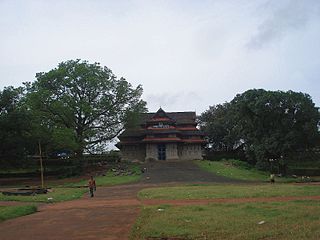
Thekkinkadu Maidanam is a historic open ground located in the center of Thrissur city in the Kerala state of India. The 65-acre area surrounds the ancient Vadakkunnathan Temple, one of the most significant Shiva temples in Kerala, and is a vital cultural and historical landmark. The maidan is under the management of the Cochin Devaswom Board and plays host to a variety of public events, including the famous Thrissur Pooram, one of the largest temple festivals in Kerala, often referred to as the "Mother of all Poorams."
Thanikkudam Bhagavathi Temple is a Hindu Temple located in Thanikkudam of Thrissur city in Kerala, on the banks of Puzhakkal River, also called Thanikkudam river. It is dedicated to Goddess Bhadrakali, in the form of 'Nanadurga'. It is famous for 'arattu' ceremony during monsoon season, when the river is flooded and enters the main sanctum, thus submerging the whole idol. This temples is one of the rare temples with such a ceremony. The temple is under the control of Cochin Devaswom Board.
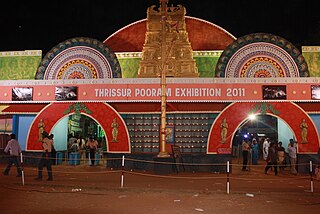
All India Agricultural, Industrial, Educational and Cultural Exhibition or commonly called the Thrissur Pooram Exhibition is an exhibition organised jointly by Paramekkavu Bagavathi Temple Devaswom and Thiruvambadi Sri Krishna Temple Devaswom, ahead of Thrissur Pooram in Thekkinkadu Maidan in Thrissur city. It is usually conducted over a period of 40 to 50 days during the Thrissur Pooram.The exhibition is the largest in Kerala in terms of attendance and floor space.
Chembukkavu Bhagavathy Temple is a Hindu temple situated in Chembukkavu, Thrissur city of Kerala, India. Cochin Devaswom Board controls the temple. It is one of the 108 Durga temples in Kerala. The temple is a participant in the Thrissur Pooram every year. The Bhagavathy at the Ayyanthole temple is considered to be the elder sister of the Chembukkavu Bhagavathy.
Cochin Devaswom Board is a socio-religious trust appointed by the Kerala Government to look after Hindu temples in central Kerala consisting of Ernakulam District, Thrissur District and Palakkad District. It is headquartered in Round north, Thrissur.
Karuvathoor Sree Ramaswamy Temple is a Hindu temple located at Kurumaldesam in the Velur panchayat of Thrissur district in the state of Kerala, India. This temple is located close to the Kurumal Sree Bhagawati Temple. Both temples function under the Cochin Devaswom Board. Karuvathur temple is about 3 km from the Vengilassery Manimalarkavu temple where the Maru Marakkal Struggle took place and also Kumbha Bharani - Kuthira Vela is celebrated and the Kururamma Temple associated with the story of Lord Krishna. Renovation work is underway at the Karuvathoor temple.
References
- ↑ The Indian Gazetteers. Ministry of Education, Government of India. 1967. p. 24. Retrieved 14 July 2015.